Contemporary Hospitality Industry
VerifiedAdded on 2022/11/25
|10
|3256
|77
AI Summary
This document provides an overview of the contemporary hospitality industry, including different types of businesses, functional and operational departments, and the impact of franchising and licensing agreements on its global development. It also discusses the contribution of the hospitality industry to local, national, and international economies, as well as the skills required for various operational roles and the current skills shortages in the industry.
Contribute Materials
Your contribution can guide someone’s learning journey. Share your
documents today.
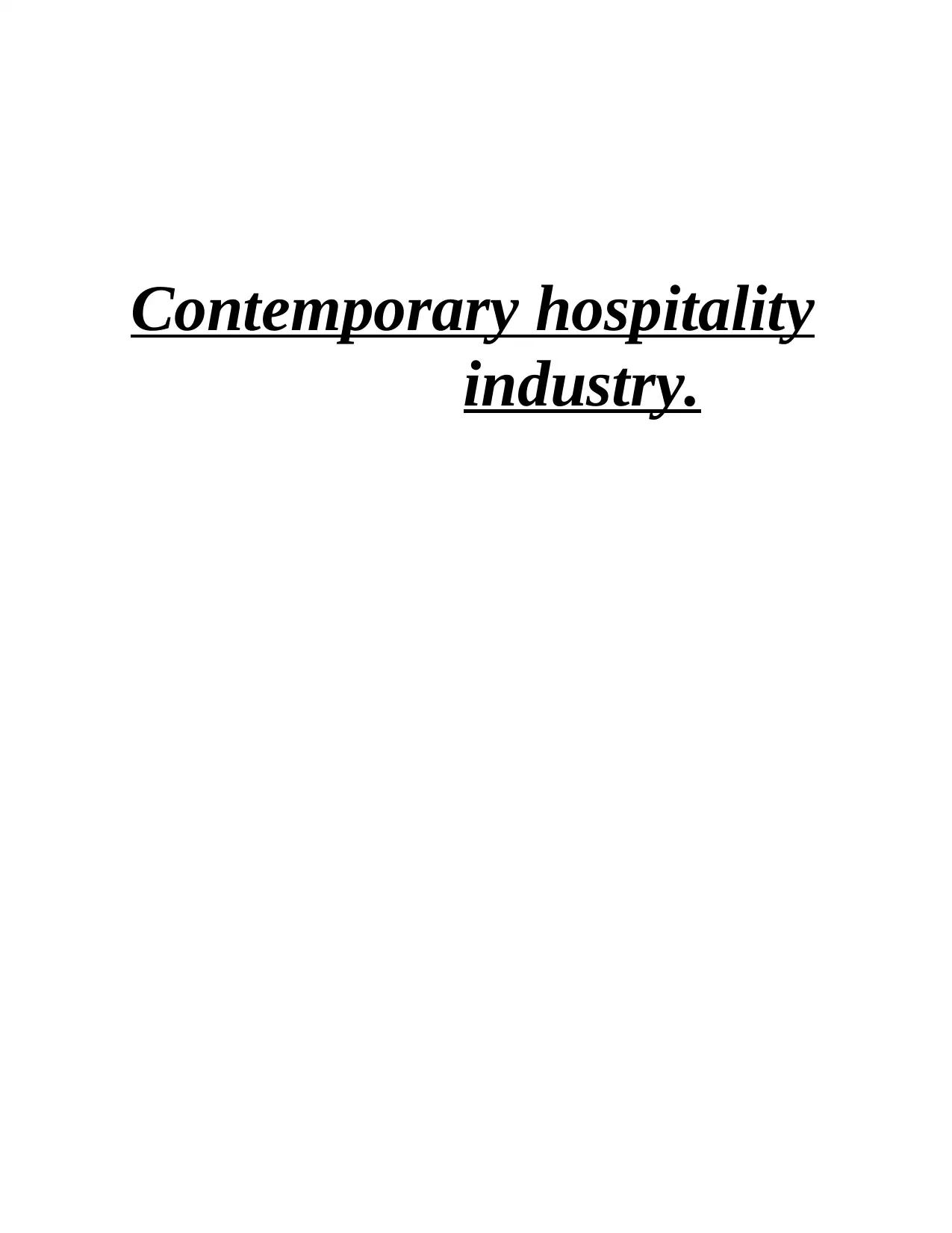
Contemporary hospitality
industry.
industry.
Secure Best Marks with AI Grader
Need help grading? Try our AI Grader for instant feedback on your assignments.
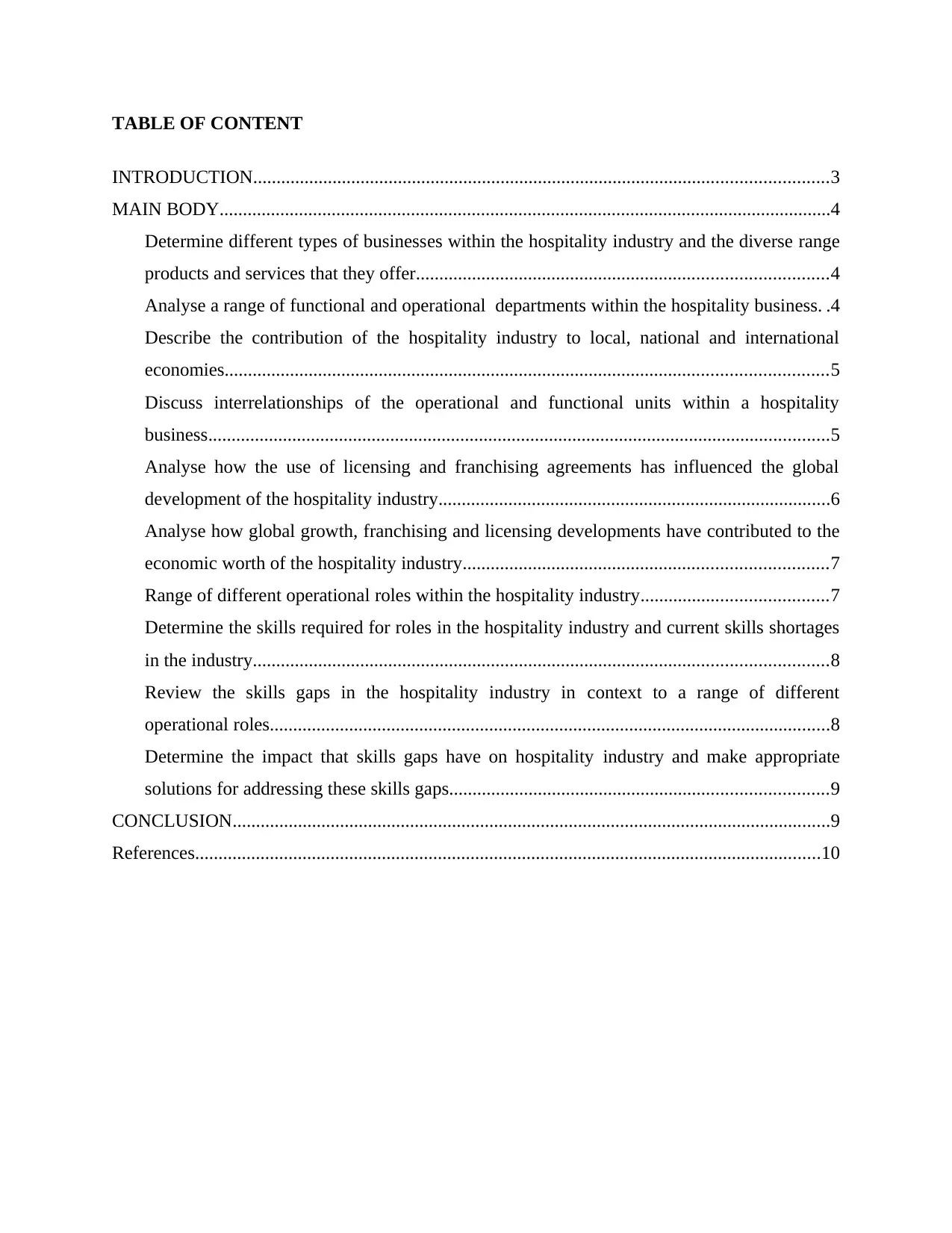
TABLE OF CONTENT
INTRODUCTION...........................................................................................................................3
MAIN BODY...................................................................................................................................4
Determine different types of businesses within the hospitality industry and the diverse range
products and services that they offer........................................................................................4
Analyse a range of functional and operational departments within the hospitality business. .4
Describe the contribution of the hospitality industry to local, national and international
economies.................................................................................................................................5
Discuss interrelationships of the operational and functional units within a hospitality
business.....................................................................................................................................5
Analyse how the use of licensing and franchising agreements has influenced the global
development of the hospitality industry....................................................................................6
Analyse how global growth, franchising and licensing developments have contributed to the
economic worth of the hospitality industry..............................................................................7
Range of different operational roles within the hospitality industry........................................7
Determine the skills required for roles in the hospitality industry and current skills shortages
in the industry...........................................................................................................................8
Review the skills gaps in the hospitality industry in context to a range of different
operational roles........................................................................................................................8
Determine the impact that skills gaps have on hospitality industry and make appropriate
solutions for addressing these skills gaps.................................................................................9
CONCLUSION................................................................................................................................9
References......................................................................................................................................10
INTRODUCTION...........................................................................................................................3
MAIN BODY...................................................................................................................................4
Determine different types of businesses within the hospitality industry and the diverse range
products and services that they offer........................................................................................4
Analyse a range of functional and operational departments within the hospitality business. .4
Describe the contribution of the hospitality industry to local, national and international
economies.................................................................................................................................5
Discuss interrelationships of the operational and functional units within a hospitality
business.....................................................................................................................................5
Analyse how the use of licensing and franchising agreements has influenced the global
development of the hospitality industry....................................................................................6
Analyse how global growth, franchising and licensing developments have contributed to the
economic worth of the hospitality industry..............................................................................7
Range of different operational roles within the hospitality industry........................................7
Determine the skills required for roles in the hospitality industry and current skills shortages
in the industry...........................................................................................................................8
Review the skills gaps in the hospitality industry in context to a range of different
operational roles........................................................................................................................8
Determine the impact that skills gaps have on hospitality industry and make appropriate
solutions for addressing these skills gaps.................................................................................9
CONCLUSION................................................................................................................................9
References......................................................................................................................................10
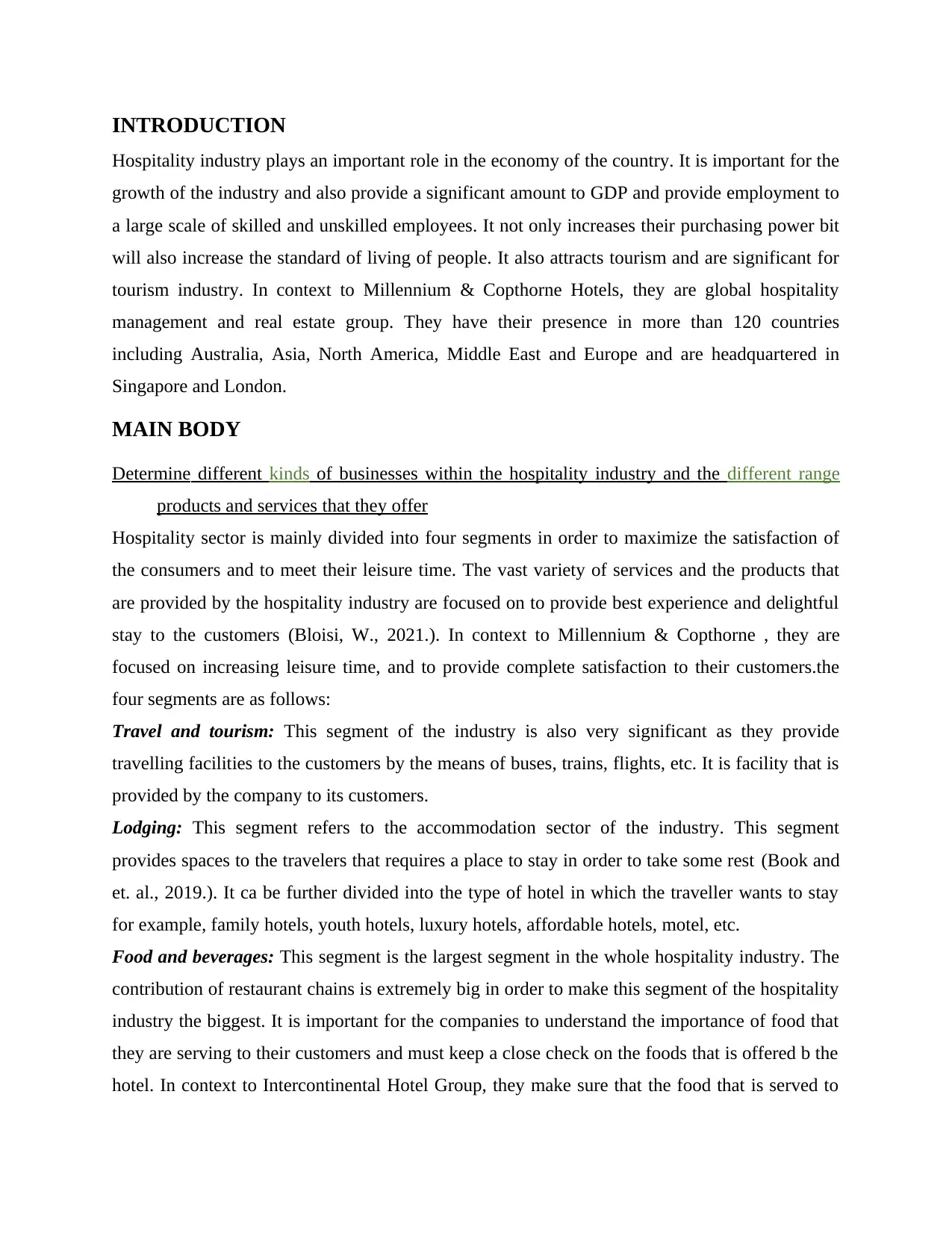
INTRODUCTION
Hospitality industry plays an important role in the economy of the country. It is important for the
growth of the industry and also provide a significant amount to GDP and provide employment to
a large scale of skilled and unskilled employees. It not only increases their purchasing power bit
will also increase the standard of living of people. It also attracts tourism and are significant for
tourism industry. In context to Millennium & Copthorne Hotels, they are global hospitality
management and real estate group. They have their presence in more than 120 countries
including Australia, Asia, North America, Middle East and Europe and are headquartered in
Singapore and London.
MAIN BODY
Determine different kinds of businesses within the hospitality industry and the different range
products and services that they offer
Hospitality sector is mainly divided into four segments in order to maximize the satisfaction of
the consumers and to meet their leisure time. The vast variety of services and the products that
are provided by the hospitality industry are focused on to provide best experience and delightful
stay to the customers (Bloisi, W., 2021.). In context to Millennium & Copthorne , they are
focused on increasing leisure time, and to provide complete satisfaction to their customers.the
four segments are as follows:
Travel and tourism: This segment of the industry is also very significant as they provide
travelling facilities to the customers by the means of buses, trains, flights, etc. It is facility that is
provided by the company to its customers.
Lodging: This segment refers to the accommodation sector of the industry. This segment
provides spaces to the travelers that requires a place to stay in order to take some rest (Book and
et. al., 2019.). It ca be further divided into the type of hotel in which the traveller wants to stay
for example, family hotels, youth hotels, luxury hotels, affordable hotels, motel, etc.
Food and beverages: This segment is the largest segment in the whole hospitality industry. The
contribution of restaurant chains is extremely big in order to make this segment of the hospitality
industry the biggest. It is important for the companies to understand the importance of food that
they are serving to their customers and must keep a close check on the foods that is offered b the
hotel. In context to Intercontinental Hotel Group, they make sure that the food that is served to
Hospitality industry plays an important role in the economy of the country. It is important for the
growth of the industry and also provide a significant amount to GDP and provide employment to
a large scale of skilled and unskilled employees. It not only increases their purchasing power bit
will also increase the standard of living of people. It also attracts tourism and are significant for
tourism industry. In context to Millennium & Copthorne Hotels, they are global hospitality
management and real estate group. They have their presence in more than 120 countries
including Australia, Asia, North America, Middle East and Europe and are headquartered in
Singapore and London.
MAIN BODY
Determine different kinds of businesses within the hospitality industry and the different range
products and services that they offer
Hospitality sector is mainly divided into four segments in order to maximize the satisfaction of
the consumers and to meet their leisure time. The vast variety of services and the products that
are provided by the hospitality industry are focused on to provide best experience and delightful
stay to the customers (Bloisi, W., 2021.). In context to Millennium & Copthorne , they are
focused on increasing leisure time, and to provide complete satisfaction to their customers.the
four segments are as follows:
Travel and tourism: This segment of the industry is also very significant as they provide
travelling facilities to the customers by the means of buses, trains, flights, etc. It is facility that is
provided by the company to its customers.
Lodging: This segment refers to the accommodation sector of the industry. This segment
provides spaces to the travelers that requires a place to stay in order to take some rest (Book and
et. al., 2019.). It ca be further divided into the type of hotel in which the traveller wants to stay
for example, family hotels, youth hotels, luxury hotels, affordable hotels, motel, etc.
Food and beverages: This segment is the largest segment in the whole hospitality industry. The
contribution of restaurant chains is extremely big in order to make this segment of the hospitality
industry the biggest. It is important for the companies to understand the importance of food that
they are serving to their customers and must keep a close check on the foods that is offered b the
hotel. In context to Intercontinental Hotel Group, they make sure that the food that is served to
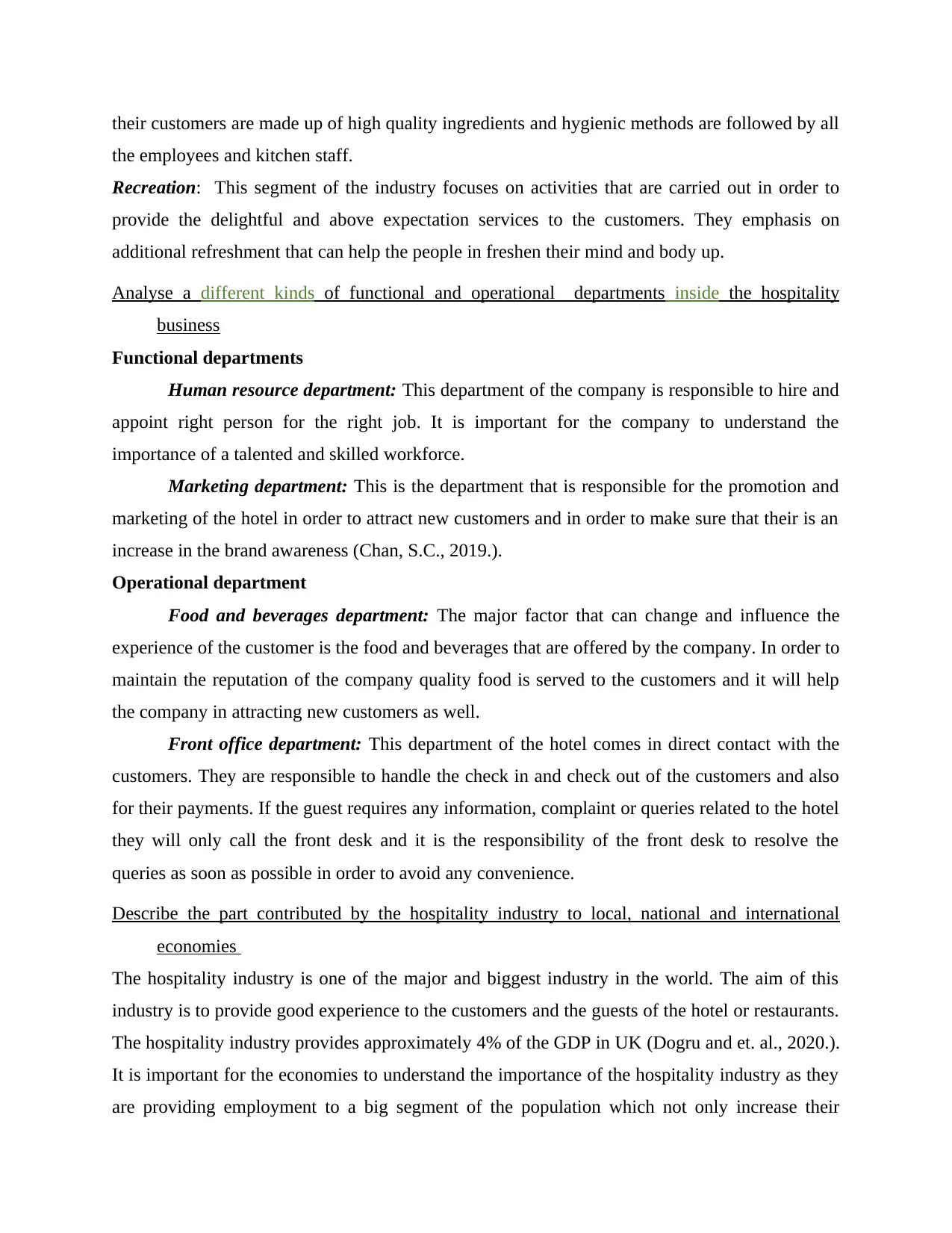
their customers are made up of high quality ingredients and hygienic methods are followed by all
the employees and kitchen staff.
Recreation: This segment of the industry focuses on activities that are carried out in order to
provide the delightful and above expectation services to the customers. They emphasis on
additional refreshment that can help the people in freshen their mind and body up.
Analyse a different kinds of functional and operational departments inside the hospitality
business
Functional departments
Human resource department: This department of the company is responsible to hire and
appoint right person for the right job. It is important for the company to understand the
importance of a talented and skilled workforce.
Marketing department: This is the department that is responsible for the promotion and
marketing of the hotel in order to attract new customers and in order to make sure that their is an
increase in the brand awareness (Chan, S.C., 2019.).
Operational department
Food and beverages department: The major factor that can change and influence the
experience of the customer is the food and beverages that are offered by the company. In order to
maintain the reputation of the company quality food is served to the customers and it will help
the company in attracting new customers as well.
Front office department: This department of the hotel comes in direct contact with the
customers. They are responsible to handle the check in and check out of the customers and also
for their payments. If the guest requires any information, complaint or queries related to the hotel
they will only call the front desk and it is the responsibility of the front desk to resolve the
queries as soon as possible in order to avoid any convenience.
Describe the part contributed by the hospitality industry to local, national and international
economies
The hospitality industry is one of the major and biggest industry in the world. The aim of this
industry is to provide good experience to the customers and the guests of the hotel or restaurants.
The hospitality industry provides approximately 4% of the GDP in UK (Dogru and et. al., 2020.).
It is important for the economies to understand the importance of the hospitality industry as they
are providing employment to a big segment of the population which not only increase their
the employees and kitchen staff.
Recreation: This segment of the industry focuses on activities that are carried out in order to
provide the delightful and above expectation services to the customers. They emphasis on
additional refreshment that can help the people in freshen their mind and body up.
Analyse a different kinds of functional and operational departments inside the hospitality
business
Functional departments
Human resource department: This department of the company is responsible to hire and
appoint right person for the right job. It is important for the company to understand the
importance of a talented and skilled workforce.
Marketing department: This is the department that is responsible for the promotion and
marketing of the hotel in order to attract new customers and in order to make sure that their is an
increase in the brand awareness (Chan, S.C., 2019.).
Operational department
Food and beverages department: The major factor that can change and influence the
experience of the customer is the food and beverages that are offered by the company. In order to
maintain the reputation of the company quality food is served to the customers and it will help
the company in attracting new customers as well.
Front office department: This department of the hotel comes in direct contact with the
customers. They are responsible to handle the check in and check out of the customers and also
for their payments. If the guest requires any information, complaint or queries related to the hotel
they will only call the front desk and it is the responsibility of the front desk to resolve the
queries as soon as possible in order to avoid any convenience.
Describe the part contributed by the hospitality industry to local, national and international
economies
The hospitality industry is one of the major and biggest industry in the world. The aim of this
industry is to provide good experience to the customers and the guests of the hotel or restaurants.
The hospitality industry provides approximately 4% of the GDP in UK (Dogru and et. al., 2020.).
It is important for the economies to understand the importance of the hospitality industry as they
are providing employment to a big segment of the population which not only increase their
Secure Best Marks with AI Grader
Need help grading? Try our AI Grader for instant feedback on your assignments.
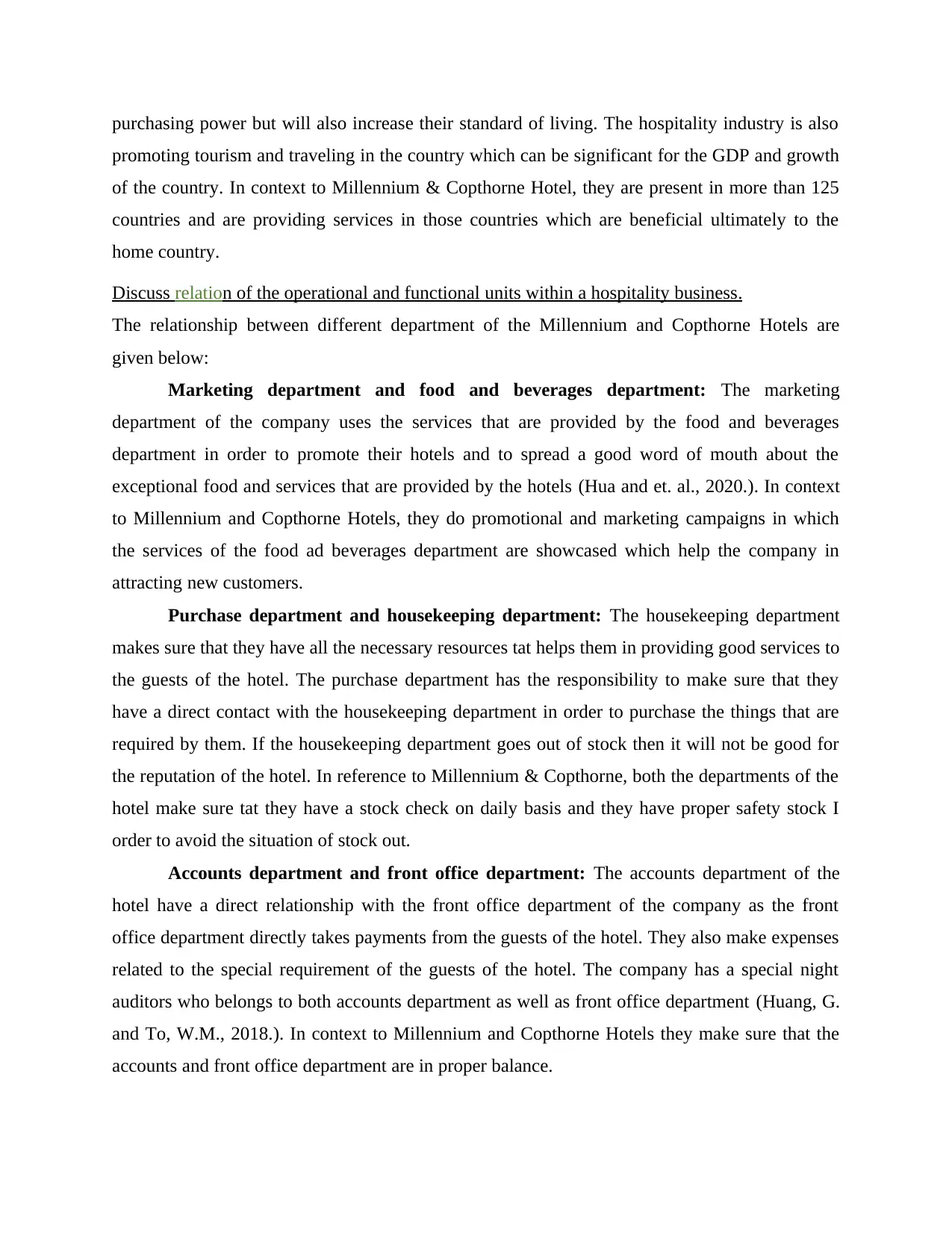
purchasing power but will also increase their standard of living. The hospitality industry is also
promoting tourism and traveling in the country which can be significant for the GDP and growth
of the country. In context to Millennium & Copthorne Hotel, they are present in more than 125
countries and are providing services in those countries which are beneficial ultimately to the
home country.
Discuss relation of the operational and functional units within a hospitality business.
The relationship between different department of the Millennium and Copthorne Hotels are
given below:
Marketing department and food and beverages department: The marketing
department of the company uses the services that are provided by the food and beverages
department in order to promote their hotels and to spread a good word of mouth about the
exceptional food and services that are provided by the hotels (Hua and et. al., 2020.). In context
to Millennium and Copthorne Hotels, they do promotional and marketing campaigns in which
the services of the food ad beverages department are showcased which help the company in
attracting new customers.
Purchase department and housekeeping department: The housekeeping department
makes sure that they have all the necessary resources tat helps them in providing good services to
the guests of the hotel. The purchase department has the responsibility to make sure that they
have a direct contact with the housekeeping department in order to purchase the things that are
required by them. If the housekeeping department goes out of stock then it will not be good for
the reputation of the hotel. In reference to Millennium & Copthorne, both the departments of the
hotel make sure tat they have a stock check on daily basis and they have proper safety stock I
order to avoid the situation of stock out.
Accounts department and front office department: The accounts department of the
hotel have a direct relationship with the front office department of the company as the front
office department directly takes payments from the guests of the hotel. They also make expenses
related to the special requirement of the guests of the hotel. The company has a special night
auditors who belongs to both accounts department as well as front office department (Huang, G.
and To, W.M., 2018.). In context to Millennium and Copthorne Hotels they make sure that the
accounts and front office department are in proper balance.
promoting tourism and traveling in the country which can be significant for the GDP and growth
of the country. In context to Millennium & Copthorne Hotel, they are present in more than 125
countries and are providing services in those countries which are beneficial ultimately to the
home country.
Discuss relation of the operational and functional units within a hospitality business.
The relationship between different department of the Millennium and Copthorne Hotels are
given below:
Marketing department and food and beverages department: The marketing
department of the company uses the services that are provided by the food and beverages
department in order to promote their hotels and to spread a good word of mouth about the
exceptional food and services that are provided by the hotels (Hua and et. al., 2020.). In context
to Millennium and Copthorne Hotels, they do promotional and marketing campaigns in which
the services of the food ad beverages department are showcased which help the company in
attracting new customers.
Purchase department and housekeeping department: The housekeeping department
makes sure that they have all the necessary resources tat helps them in providing good services to
the guests of the hotel. The purchase department has the responsibility to make sure that they
have a direct contact with the housekeeping department in order to purchase the things that are
required by them. If the housekeeping department goes out of stock then it will not be good for
the reputation of the hotel. In reference to Millennium & Copthorne, both the departments of the
hotel make sure tat they have a stock check on daily basis and they have proper safety stock I
order to avoid the situation of stock out.
Accounts department and front office department: The accounts department of the
hotel have a direct relationship with the front office department of the company as the front
office department directly takes payments from the guests of the hotel. They also make expenses
related to the special requirement of the guests of the hotel. The company has a special night
auditors who belongs to both accounts department as well as front office department (Huang, G.
and To, W.M., 2018.). In context to Millennium and Copthorne Hotels they make sure that the
accounts and front office department are in proper balance.
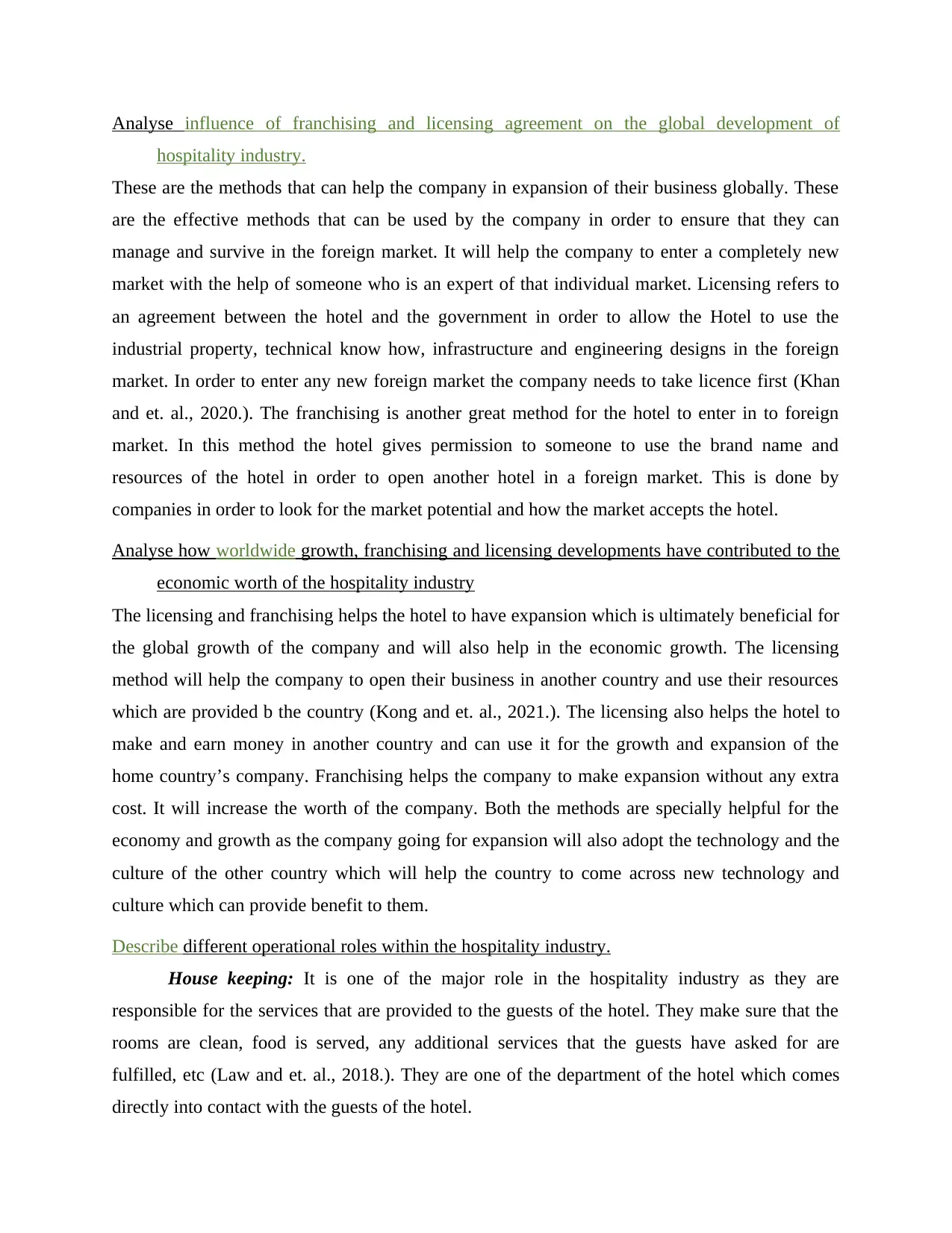
Analyse influence of franchising and licensing agreement on the global development of
hospitality industry.
These are the methods that can help the company in expansion of their business globally. These
are the effective methods that can be used by the company in order to ensure that they can
manage and survive in the foreign market. It will help the company to enter a completely new
market with the help of someone who is an expert of that individual market. Licensing refers to
an agreement between the hotel and the government in order to allow the Hotel to use the
industrial property, technical know how, infrastructure and engineering designs in the foreign
market. In order to enter any new foreign market the company needs to take licence first (Khan
and et. al., 2020.). The franchising is another great method for the hotel to enter in to foreign
market. In this method the hotel gives permission to someone to use the brand name and
resources of the hotel in order to open another hotel in a foreign market. This is done by
companies in order to look for the market potential and how the market accepts the hotel.
Analyse how worldwide growth, franchising and licensing developments have contributed to the
economic worth of the hospitality industry
The licensing and franchising helps the hotel to have expansion which is ultimately beneficial for
the global growth of the company and will also help in the economic growth. The licensing
method will help the company to open their business in another country and use their resources
which are provided b the country (Kong and et. al., 2021.). The licensing also helps the hotel to
make and earn money in another country and can use it for the growth and expansion of the
home country’s company. Franchising helps the company to make expansion without any extra
cost. It will increase the worth of the company. Both the methods are specially helpful for the
economy and growth as the company going for expansion will also adopt the technology and the
culture of the other country which will help the country to come across new technology and
culture which can provide benefit to them.
Describe different operational roles within the hospitality industry.
House keeping: It is one of the major role in the hospitality industry as they are
responsible for the services that are provided to the guests of the hotel. They make sure that the
rooms are clean, food is served, any additional services that the guests have asked for are
fulfilled, etc (Law and et. al., 2018.). They are one of the department of the hotel which comes
directly into contact with the guests of the hotel.
hospitality industry.
These are the methods that can help the company in expansion of their business globally. These
are the effective methods that can be used by the company in order to ensure that they can
manage and survive in the foreign market. It will help the company to enter a completely new
market with the help of someone who is an expert of that individual market. Licensing refers to
an agreement between the hotel and the government in order to allow the Hotel to use the
industrial property, technical know how, infrastructure and engineering designs in the foreign
market. In order to enter any new foreign market the company needs to take licence first (Khan
and et. al., 2020.). The franchising is another great method for the hotel to enter in to foreign
market. In this method the hotel gives permission to someone to use the brand name and
resources of the hotel in order to open another hotel in a foreign market. This is done by
companies in order to look for the market potential and how the market accepts the hotel.
Analyse how worldwide growth, franchising and licensing developments have contributed to the
economic worth of the hospitality industry
The licensing and franchising helps the hotel to have expansion which is ultimately beneficial for
the global growth of the company and will also help in the economic growth. The licensing
method will help the company to open their business in another country and use their resources
which are provided b the country (Kong and et. al., 2021.). The licensing also helps the hotel to
make and earn money in another country and can use it for the growth and expansion of the
home country’s company. Franchising helps the company to make expansion without any extra
cost. It will increase the worth of the company. Both the methods are specially helpful for the
economy and growth as the company going for expansion will also adopt the technology and the
culture of the other country which will help the country to come across new technology and
culture which can provide benefit to them.
Describe different operational roles within the hospitality industry.
House keeping: It is one of the major role in the hospitality industry as they are
responsible for the services that are provided to the guests of the hotel. They make sure that the
rooms are clean, food is served, any additional services that the guests have asked for are
fulfilled, etc (Law and et. al., 2018.). They are one of the department of the hotel which comes
directly into contact with the guests of the hotel.
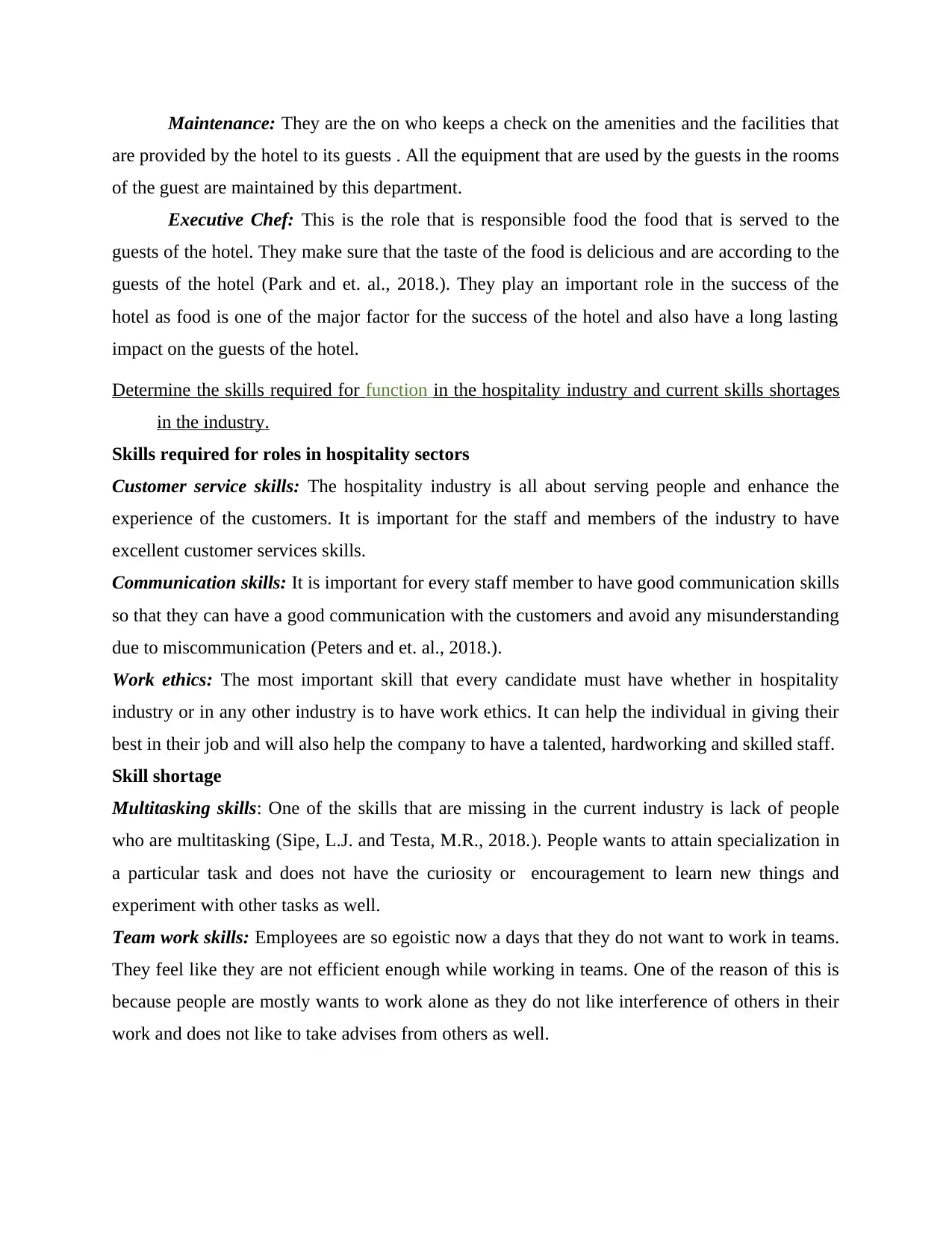
Maintenance: They are the on who keeps a check on the amenities and the facilities that
are provided by the hotel to its guests . All the equipment that are used by the guests in the rooms
of the guest are maintained by this department.
Executive Chef: This is the role that is responsible food the food that is served to the
guests of the hotel. They make sure that the taste of the food is delicious and are according to the
guests of the hotel (Park and et. al., 2018.). They play an important role in the success of the
hotel as food is one of the major factor for the success of the hotel and also have a long lasting
impact on the guests of the hotel.
Determine the skills required for function in the hospitality industry and current skills shortages
in the industry.
Skills required for roles in hospitality sectors
Customer service skills: The hospitality industry is all about serving people and enhance the
experience of the customers. It is important for the staff and members of the industry to have
excellent customer services skills.
Communication skills: It is important for every staff member to have good communication skills
so that they can have a good communication with the customers and avoid any misunderstanding
due to miscommunication (Peters and et. al., 2018.).
Work ethics: The most important skill that every candidate must have whether in hospitality
industry or in any other industry is to have work ethics. It can help the individual in giving their
best in their job and will also help the company to have a talented, hardworking and skilled staff.
Skill shortage
Multitasking skills: One of the skills that are missing in the current industry is lack of people
who are multitasking (Sipe, L.J. and Testa, M.R., 2018.). People wants to attain specialization in
a particular task and does not have the curiosity or encouragement to learn new things and
experiment with other tasks as well.
Team work skills: Employees are so egoistic now a days that they do not want to work in teams.
They feel like they are not efficient enough while working in teams. One of the reason of this is
because people are mostly wants to work alone as they do not like interference of others in their
work and does not like to take advises from others as well.
are provided by the hotel to its guests . All the equipment that are used by the guests in the rooms
of the guest are maintained by this department.
Executive Chef: This is the role that is responsible food the food that is served to the
guests of the hotel. They make sure that the taste of the food is delicious and are according to the
guests of the hotel (Park and et. al., 2018.). They play an important role in the success of the
hotel as food is one of the major factor for the success of the hotel and also have a long lasting
impact on the guests of the hotel.
Determine the skills required for function in the hospitality industry and current skills shortages
in the industry.
Skills required for roles in hospitality sectors
Customer service skills: The hospitality industry is all about serving people and enhance the
experience of the customers. It is important for the staff and members of the industry to have
excellent customer services skills.
Communication skills: It is important for every staff member to have good communication skills
so that they can have a good communication with the customers and avoid any misunderstanding
due to miscommunication (Peters and et. al., 2018.).
Work ethics: The most important skill that every candidate must have whether in hospitality
industry or in any other industry is to have work ethics. It can help the individual in giving their
best in their job and will also help the company to have a talented, hardworking and skilled staff.
Skill shortage
Multitasking skills: One of the skills that are missing in the current industry is lack of people
who are multitasking (Sipe, L.J. and Testa, M.R., 2018.). People wants to attain specialization in
a particular task and does not have the curiosity or encouragement to learn new things and
experiment with other tasks as well.
Team work skills: Employees are so egoistic now a days that they do not want to work in teams.
They feel like they are not efficient enough while working in teams. One of the reason of this is
because people are mostly wants to work alone as they do not like interference of others in their
work and does not like to take advises from others as well.
Paraphrase This Document
Need a fresh take? Get an instant paraphrase of this document with our AI Paraphraser
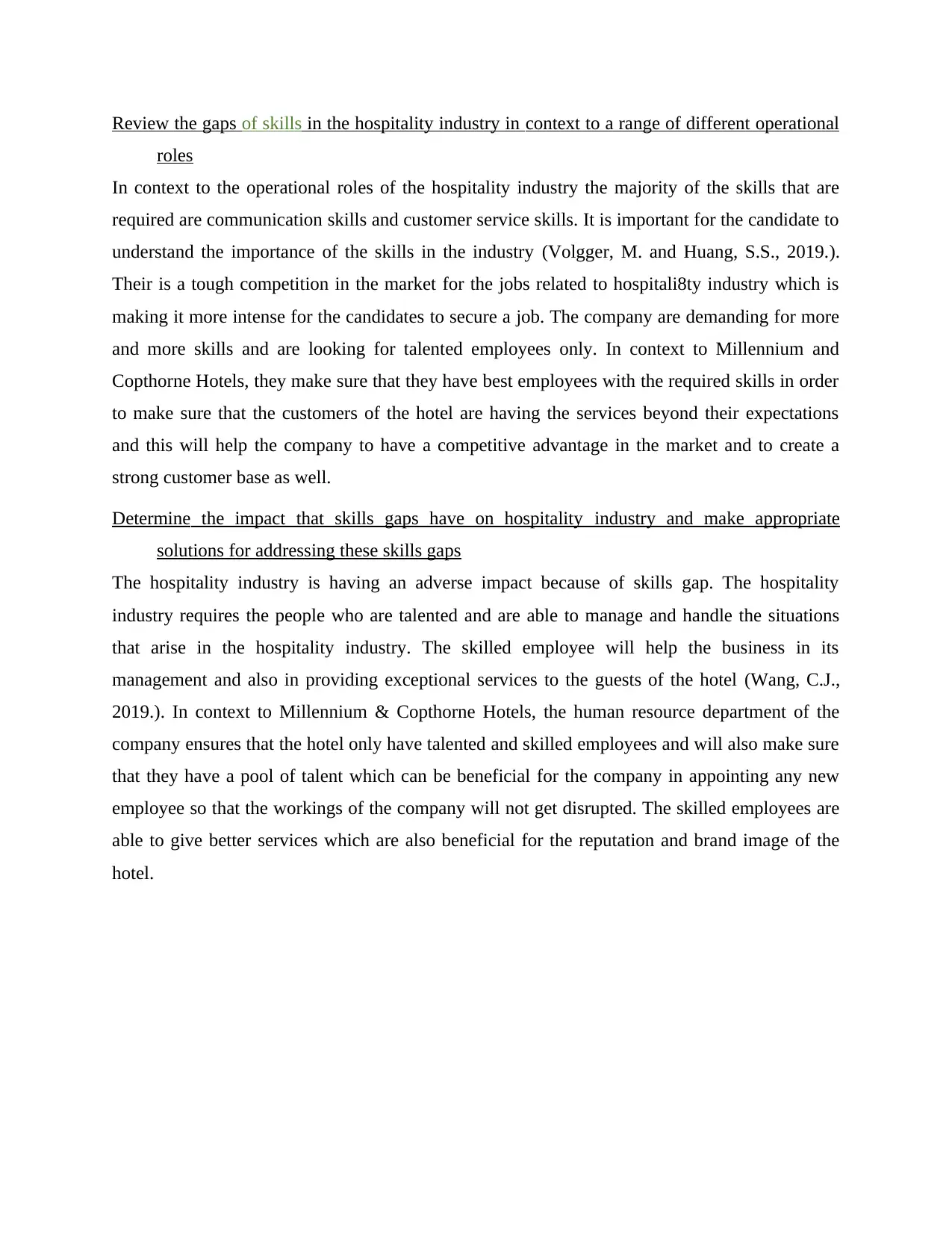
Review the gaps of skills in the hospitality industry in context to a range of different operational
roles
In context to the operational roles of the hospitality industry the majority of the skills that are
required are communication skills and customer service skills. It is important for the candidate to
understand the importance of the skills in the industry (Volgger, M. and Huang, S.S., 2019.).
Their is a tough competition in the market for the jobs related to hospitali8ty industry which is
making it more intense for the candidates to secure a job. The company are demanding for more
and more skills and are looking for talented employees only. In context to Millennium and
Copthorne Hotels, they make sure that they have best employees with the required skills in order
to make sure that the customers of the hotel are having the services beyond their expectations
and this will help the company to have a competitive advantage in the market and to create a
strong customer base as well.
Determine the impact that skills gaps have on hospitality industry and make appropriate
solutions for addressing these skills gaps
The hospitality industry is having an adverse impact because of skills gap. The hospitality
industry requires the people who are talented and are able to manage and handle the situations
that arise in the hospitality industry. The skilled employee will help the business in its
management and also in providing exceptional services to the guests of the hotel (Wang, C.J.,
2019.). In context to Millennium & Copthorne Hotels, the human resource department of the
company ensures that the hotel only have talented and skilled employees and will also make sure
that they have a pool of talent which can be beneficial for the company in appointing any new
employee so that the workings of the company will not get disrupted. The skilled employees are
able to give better services which are also beneficial for the reputation and brand image of the
hotel.
roles
In context to the operational roles of the hospitality industry the majority of the skills that are
required are communication skills and customer service skills. It is important for the candidate to
understand the importance of the skills in the industry (Volgger, M. and Huang, S.S., 2019.).
Their is a tough competition in the market for the jobs related to hospitali8ty industry which is
making it more intense for the candidates to secure a job. The company are demanding for more
and more skills and are looking for talented employees only. In context to Millennium and
Copthorne Hotels, they make sure that they have best employees with the required skills in order
to make sure that the customers of the hotel are having the services beyond their expectations
and this will help the company to have a competitive advantage in the market and to create a
strong customer base as well.
Determine the impact that skills gaps have on hospitality industry and make appropriate
solutions for addressing these skills gaps
The hospitality industry is having an adverse impact because of skills gap. The hospitality
industry requires the people who are talented and are able to manage and handle the situations
that arise in the hospitality industry. The skilled employee will help the business in its
management and also in providing exceptional services to the guests of the hotel (Wang, C.J.,
2019.). In context to Millennium & Copthorne Hotels, the human resource department of the
company ensures that the hotel only have talented and skilled employees and will also make sure
that they have a pool of talent which can be beneficial for the company in appointing any new
employee so that the workings of the company will not get disrupted. The skilled employees are
able to give better services which are also beneficial for the reputation and brand image of the
hotel.
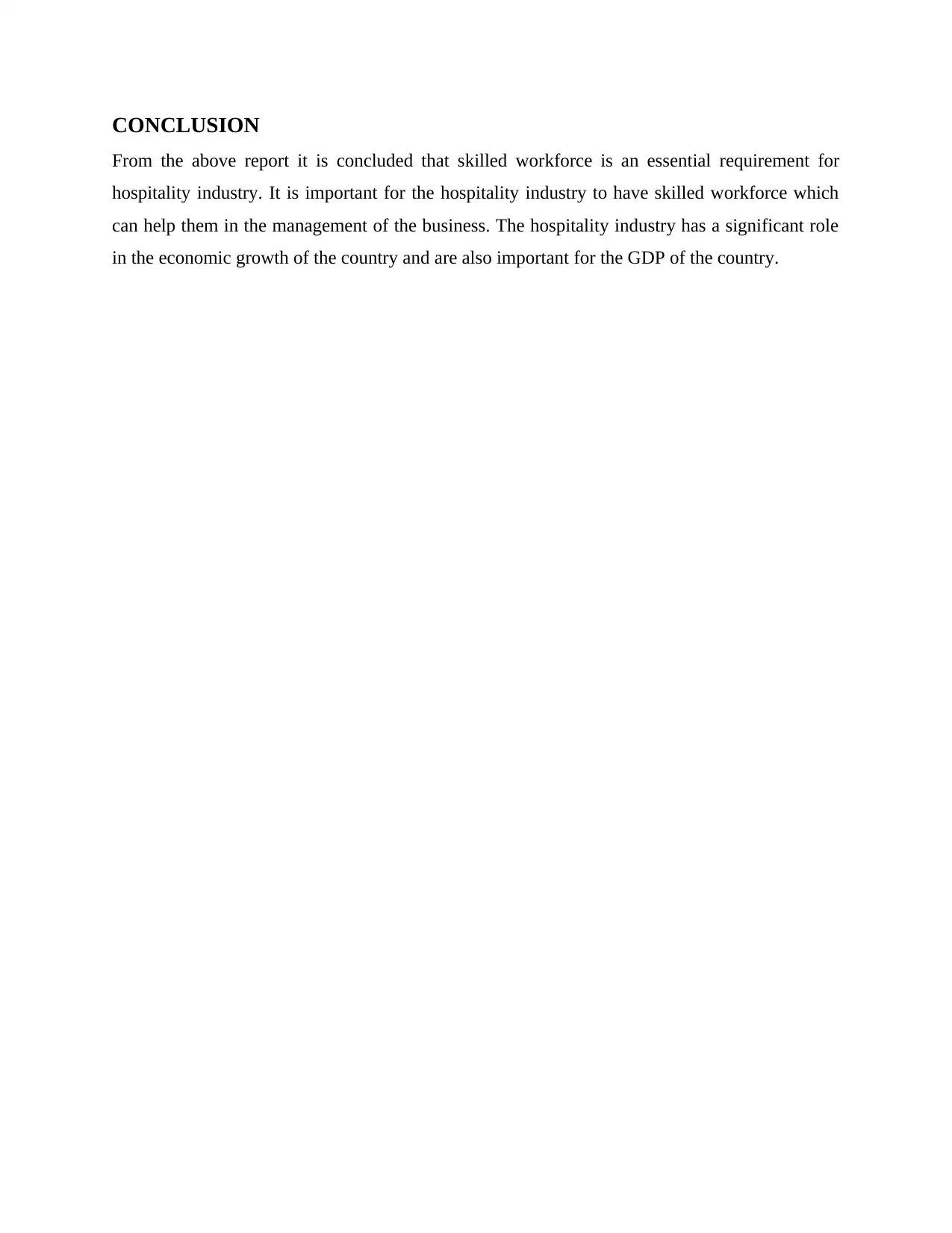
CONCLUSION
From the above report it is concluded that skilled workforce is an essential requirement for
hospitality industry. It is important for the hospitality industry to have skilled workforce which
can help them in the management of the business. The hospitality industry has a significant role
in the economic growth of the country and are also important for the GDP of the country.
From the above report it is concluded that skilled workforce is an essential requirement for
hospitality industry. It is important for the hospitality industry to have skilled workforce which
can help them in the management of the business. The hospitality industry has a significant role
in the economic growth of the country and are also important for the GDP of the country.
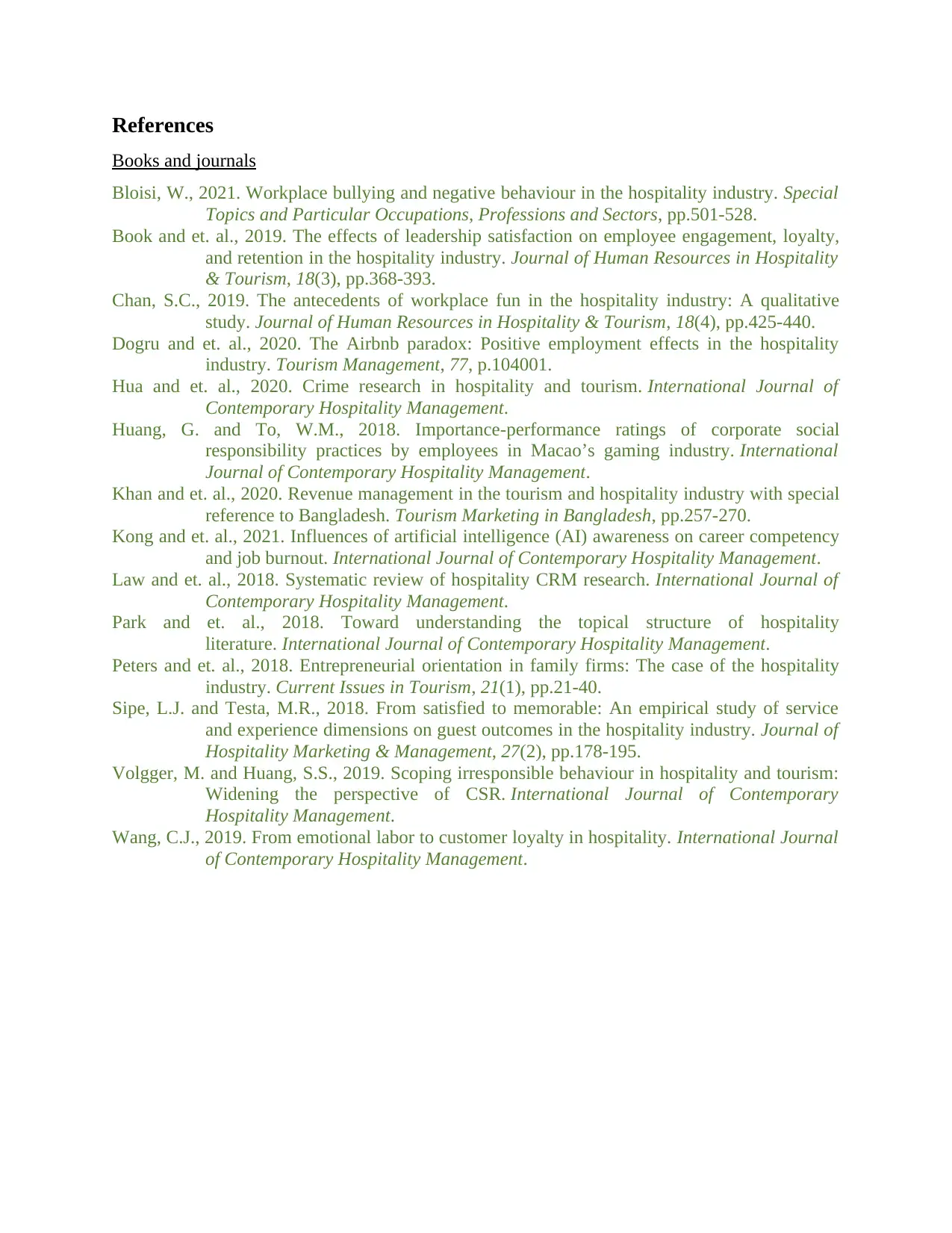
References
Books and journals
Bloisi, W., 2021. Workplace bullying and negative behaviour in the hospitality industry. Special
Topics and Particular Occupations, Professions and Sectors, pp.501-528.
Book and et. al., 2019. The effects of leadership satisfaction on employee engagement, loyalty,
and retention in the hospitality industry. Journal of Human Resources in Hospitality
& Tourism, 18(3), pp.368-393.
Chan, S.C., 2019. The antecedents of workplace fun in the hospitality industry: A qualitative
study. Journal of Human Resources in Hospitality & Tourism, 18(4), pp.425-440.
Dogru and et. al., 2020. The Airbnb paradox: Positive employment effects in the hospitality
industry. Tourism Management, 77, p.104001.
Hua and et. al., 2020. Crime research in hospitality and tourism. International Journal of
Contemporary Hospitality Management.
Huang, G. and To, W.M., 2018. Importance-performance ratings of corporate social
responsibility practices by employees in Macao’s gaming industry. International
Journal of Contemporary Hospitality Management.
Khan and et. al., 2020. Revenue management in the tourism and hospitality industry with special
reference to Bangladesh. Tourism Marketing in Bangladesh, pp.257-270.
Kong and et. al., 2021. Influences of artificial intelligence (AI) awareness on career competency
and job burnout. International Journal of Contemporary Hospitality Management.
Law and et. al., 2018. Systematic review of hospitality CRM research. International Journal of
Contemporary Hospitality Management.
Park and et. al., 2018. Toward understanding the topical structure of hospitality
literature. International Journal of Contemporary Hospitality Management.
Peters and et. al., 2018. Entrepreneurial orientation in family firms: The case of the hospitality
industry. Current Issues in Tourism, 21(1), pp.21-40.
Sipe, L.J. and Testa, M.R., 2018. From satisfied to memorable: An empirical study of service
and experience dimensions on guest outcomes in the hospitality industry. Journal of
Hospitality Marketing & Management, 27(2), pp.178-195.
Volgger, M. and Huang, S.S., 2019. Scoping irresponsible behaviour in hospitality and tourism:
Widening the perspective of CSR. International Journal of Contemporary
Hospitality Management.
Wang, C.J., 2019. From emotional labor to customer loyalty in hospitality. International Journal
of Contemporary Hospitality Management.
Books and journals
Bloisi, W., 2021. Workplace bullying and negative behaviour in the hospitality industry. Special
Topics and Particular Occupations, Professions and Sectors, pp.501-528.
Book and et. al., 2019. The effects of leadership satisfaction on employee engagement, loyalty,
and retention in the hospitality industry. Journal of Human Resources in Hospitality
& Tourism, 18(3), pp.368-393.
Chan, S.C., 2019. The antecedents of workplace fun in the hospitality industry: A qualitative
study. Journal of Human Resources in Hospitality & Tourism, 18(4), pp.425-440.
Dogru and et. al., 2020. The Airbnb paradox: Positive employment effects in the hospitality
industry. Tourism Management, 77, p.104001.
Hua and et. al., 2020. Crime research in hospitality and tourism. International Journal of
Contemporary Hospitality Management.
Huang, G. and To, W.M., 2018. Importance-performance ratings of corporate social
responsibility practices by employees in Macao’s gaming industry. International
Journal of Contemporary Hospitality Management.
Khan and et. al., 2020. Revenue management in the tourism and hospitality industry with special
reference to Bangladesh. Tourism Marketing in Bangladesh, pp.257-270.
Kong and et. al., 2021. Influences of artificial intelligence (AI) awareness on career competency
and job burnout. International Journal of Contemporary Hospitality Management.
Law and et. al., 2018. Systematic review of hospitality CRM research. International Journal of
Contemporary Hospitality Management.
Park and et. al., 2018. Toward understanding the topical structure of hospitality
literature. International Journal of Contemporary Hospitality Management.
Peters and et. al., 2018. Entrepreneurial orientation in family firms: The case of the hospitality
industry. Current Issues in Tourism, 21(1), pp.21-40.
Sipe, L.J. and Testa, M.R., 2018. From satisfied to memorable: An empirical study of service
and experience dimensions on guest outcomes in the hospitality industry. Journal of
Hospitality Marketing & Management, 27(2), pp.178-195.
Volgger, M. and Huang, S.S., 2019. Scoping irresponsible behaviour in hospitality and tourism:
Widening the perspective of CSR. International Journal of Contemporary
Hospitality Management.
Wang, C.J., 2019. From emotional labor to customer loyalty in hospitality. International Journal
of Contemporary Hospitality Management.
1 out of 10
Related Documents
Your All-in-One AI-Powered Toolkit for Academic Success.
+13062052269
info@desklib.com
Available 24*7 on WhatsApp / Email
![[object Object]](/_next/static/media/star-bottom.7253800d.svg)
Unlock your academic potential
© 2024 | Zucol Services PVT LTD | All rights reserved.





